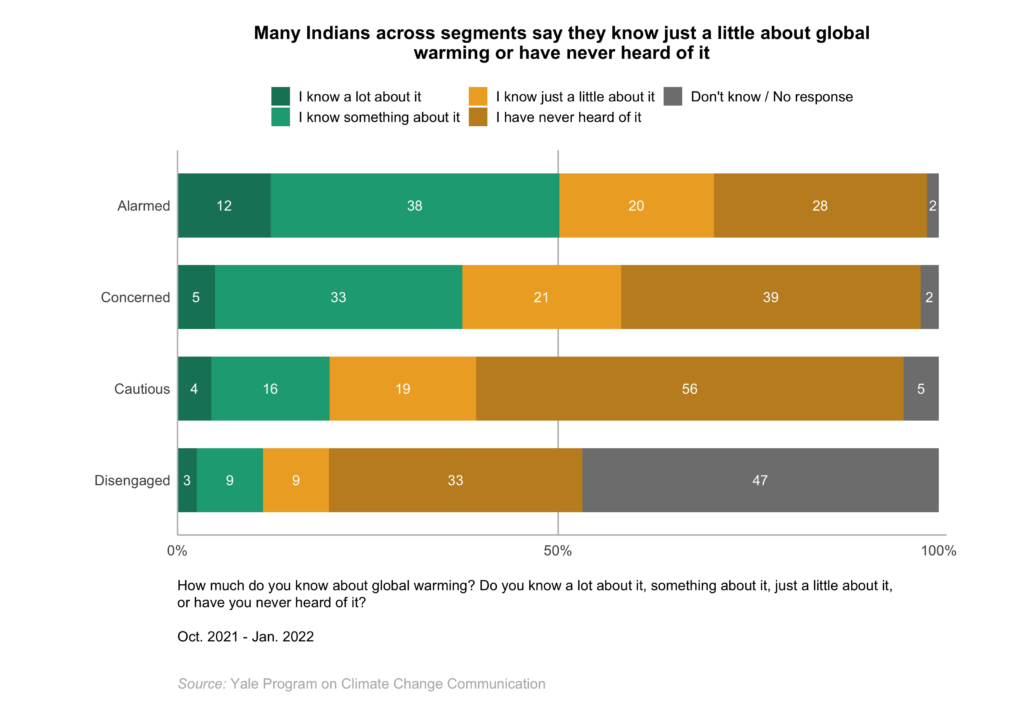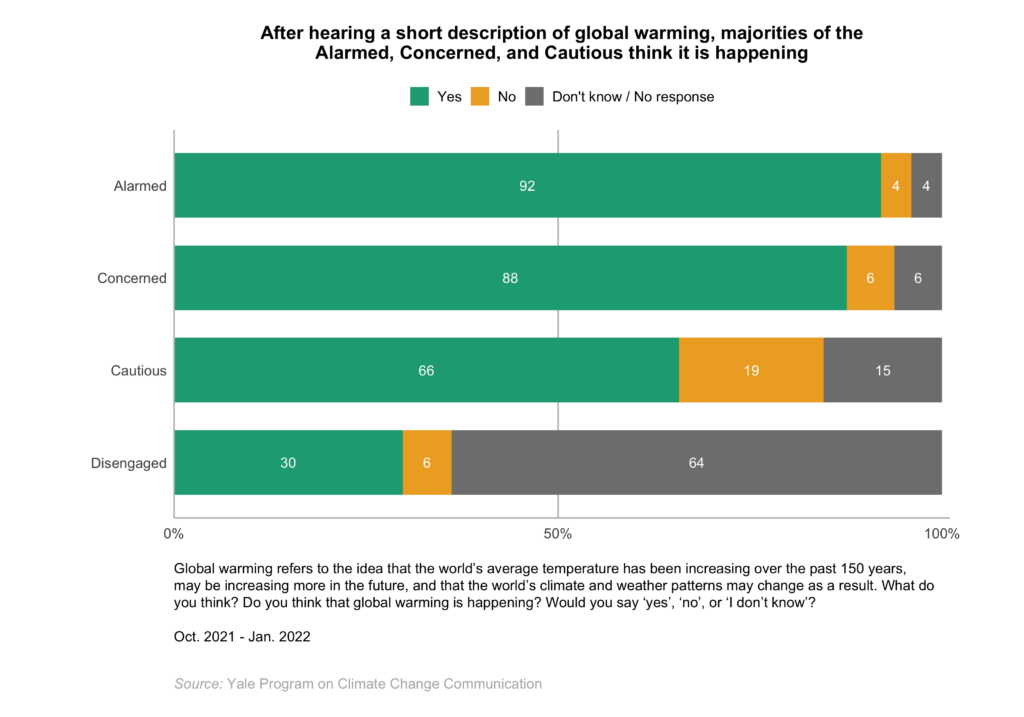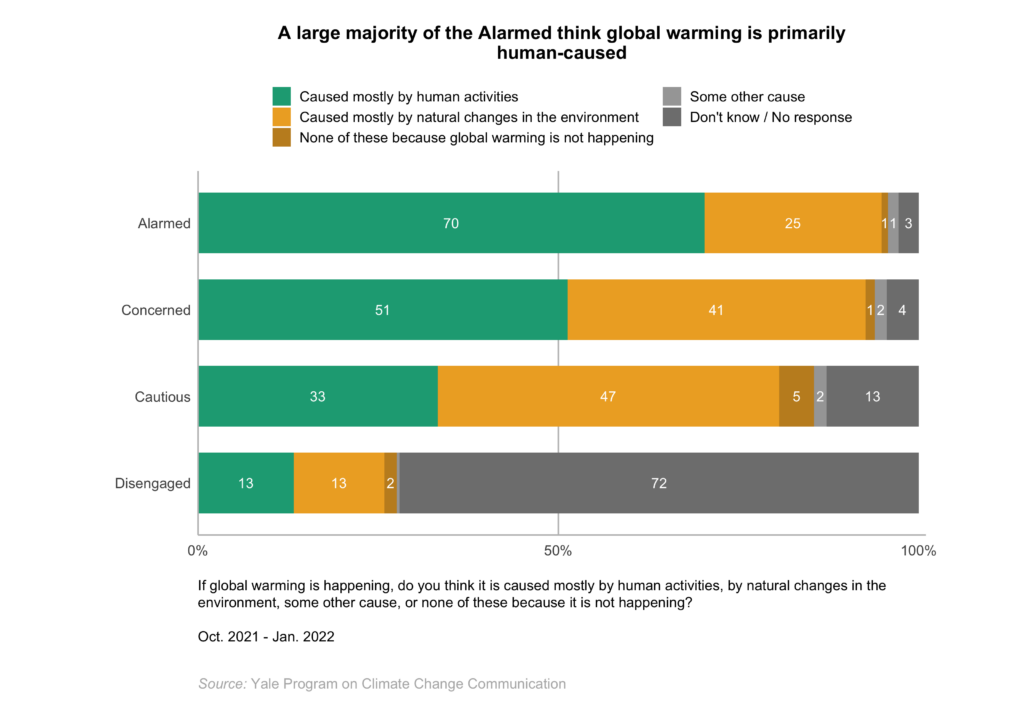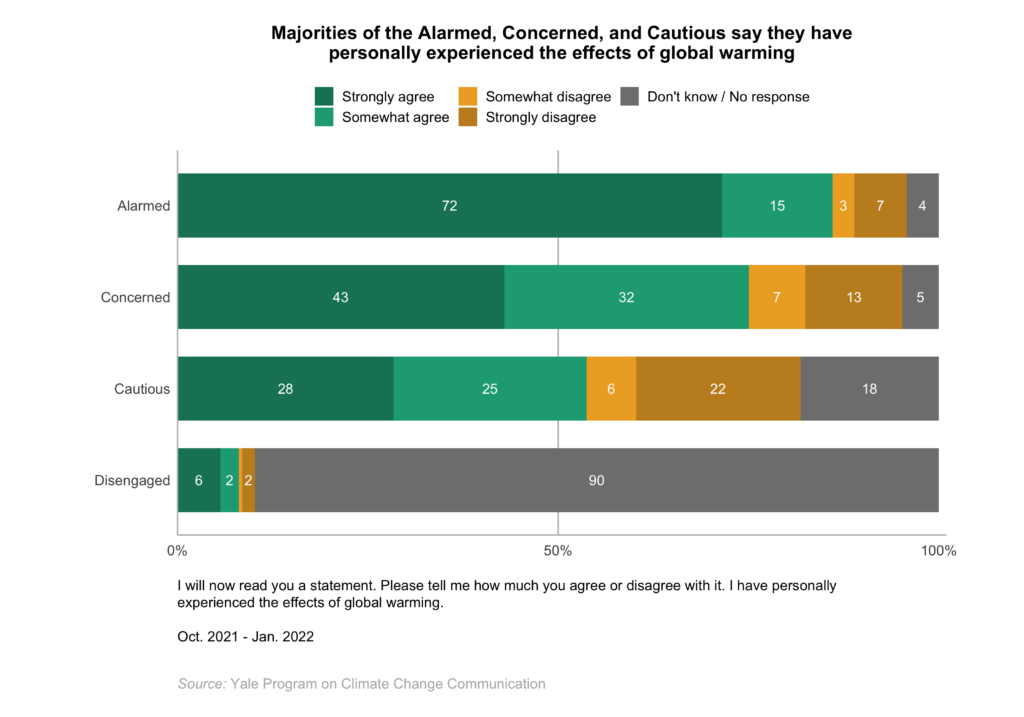Report · May 4, 2023
Global Warming’s Four Indias, 2022: An Audience Segmentation Analysis
By Anthony Leiserowitz, Jagadish Thaker, Matthew Goldberg, Matthew Ballew, Seth Rosenthal, Jennifer Carman, Liz Neyens, Sanguk Lee, Yashwant Deshmukh, Gaura Shukla and Jennifer Marlon
Filed under: Beliefs & Attitudes, Policy & Politics, Behaviors & Actions and Audiences
2. Global Warming Awareness and Beliefs
Questions about global warming awareness and beliefs include respondents’ assessments of whether they think global warming is happening, whether they think it is primarily caused by human activities, how much they know about global warming, and their degree of personal experience with its effects.The segmentation was completed using survey items that followed the presentation of a brief definition/description of global warming. Many people in India, including many who are in the Alarmed and Concerned segments/audience, are not highly familiar with the term “global warming” itself (refer to the first chart in this section), but realize they are very familiar and engaged with the concept of global warming once they read a short definition/description of the term.
Alarmed
The Alarmed have the strongest acceptance and understanding of global warming. Of the four segments, the Alarmed feel most knowledgeable about global warming – half of the Alarmed (50%) say they either know “a lot” (12%) or “something” (38%) about global warming. After a brief description of global warming is provided, nearly all of the Alarmed say they think it is happening (92%). A large majority of the Alarmed (70%) think global warming is caused mostly by human activities, while only one in four (25%) think it is caused mostly by natural changes in the environment. The Alarmed also report the highest level of personal experience with global warming: a large majority (86%) either “strongly agree” (72%) or “somewhat agree” (15%) that they have personally experienced its effects.
Concerned
The Concerned feel less knowledgeable about global warming than the Alarmed. While 37% of the Concerned say they either know “a lot” (5%) or “something” (33%) about it, the majority (60%) say they either know “just a little about it” (21%) or “have never heard of it” (39%). After a brief description of global warming is provided, a large majority of the Concerned say they think it is happening (88%). However, the Concerned are less likely than the Alarmed to think global warming is caused mostly by human activities (51%), with many thinking it is caused mostly by natural changes in the environment (41%). The Concerned report high levels of personal experience with global warming – three in four (75%) either “strongly agree” (43%) or “somewhat agree” (32%) that they have personally experienced its effects.
Cautious
The Cautious feel much less knowledgeable about global warming than the Alarmed and Concerned. While 20% of the Cautious say they either know “a lot” (4%) or “something” (16%) about global warming, most (75%) say they either know “just a little about it” (19%) or “have never heard of it” (56%). After a brief description of global warming is provided, about two in three of the Cautious (66%) say they think it is happening. The Cautious are more likely to think global warming is caused mostly by natural changes in the environment (47%) than by human activities (33%). Although a majority of the Cautious (54%) either “strongly agree” (28%) or “somewhat agree” (25%) that they have personally experienced the effects of global warming, they also express the highest levels of disagreement out of all the segments, with 22% saying they “strongly disagree” that they have personally experienced global warming’s effects.
Disengaged
The Disengaged are the segment most likely to say they don’t know or to not express an opinion when asked about their global warming awareness and beliefs (ranging from 47% to 90% across questions). Few of the Disengaged (11%) say they say they either know “a lot” (3%) or “something” (9%) about global warming, while 42% either say they know “just a little about it” (9%) or “have never heard of it” (33%). After a brief description of global warming is provided, the Disengaged are much less likely than the other segments to say they think global warming is happening (30%). Few of the Disengaged have an opinion about what causes global warming – 13% think global warming is caused mostly by human activities and 13% think it is caused by natural changes in the environment. Only 8% of the Disengaged say they either “strongly agree” (6%) or “somewhat agree” (2%) they have personally experienced the effects of global warming.



